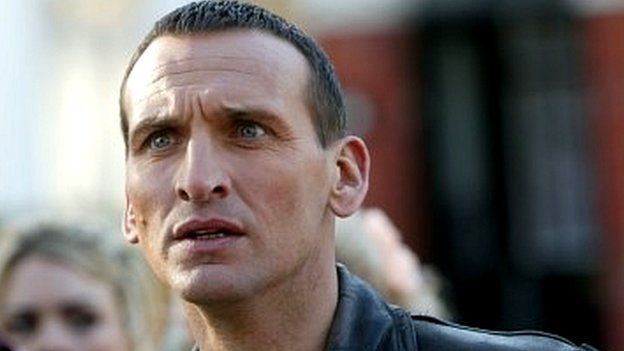Register to vote before time runs out - ex-Doctor Who
- Published

Ex-Doctor Who actor Christopher Eccleston has joined politicians and celebrities urging people to register to vote ahead of the midnight deadline.
People should "trust their instincts" and "believe in the process", he said.
People can register online or visit their local town hall offices to fill in a paper form, although it is too late post a paper registration form.
The Electoral Commission said 1.8m applications to register have been made in the past five weeks, mostly online.
Of those who have signed up since 16 March, 569,771 of those were 16 to 24-year-olds.
The 120,000 people on 19 April was the most in a single day so far. There were 110,000 applications on 16 April, the day the BBC aired the debate with opposition leaders.
The majority of those website visits were made after host David Dimbleby mentioned registration at the close of the programme.
The day with the next highest number of online applications was 30 March, which was the start of the official general election campaign period and the dissolution of Parliament.
Has the number of voters fallen?
On Friday, the Office for National Statistics (ONS) published figures for the number of people registered to vote in parliamentary elections.
It turns out that as of December 2014, there were 45,325,100 people registered to vote in the UK, which was down 1.8% on the previous year.
There are two reasons why this figure may not give the full picture.
Despite this, it is estimated there could still be as many as 7.5 million unregistered voters among the 45 million people eligible to vote.
Electoral Commission chairwoman Jenny Watson said: "It takes just a few minutes to apply to register online, so do it now.
"We don't want anyone to miss out, but if you miss the deadline on 20 April and then try to vote you will be turned away from the polling station on election day. Make sure this doesn't happen to you."
Politicians including Nigel Farage and Natalie Bennett have been reminding their Twitter followers to register in time.
Ed Miliband tweeted: "Your vote on 7 May can help change Britain. But you need to make sure you're registered before midnight tonight."
'Don't miss out'
Comedian Russell Brand has questioned the value of having a vote, arguing that it changes little in a political system dominated by like-minded elites and urging people to use other means - including direct action - to try and get things done.
This view has been challenged by other public figures, including actor Michael Sheen, satirist Armando Iannucci and comedian and Labour activist Eddie Izzard, who have urged people to register to make their voice heard.
Christopher Eccleston, who played the title role in Doctor Who's comeback series in 2005, said first-time voters must "trust their own instincts and listen to their own heart".
"There are people that are worth voting for" he told BBC Radio 5Live's Afternoon Edition. "I've been disappointed by all the parties through a 51-year old life but I still believe in the process. I still have hope."
Campaign groups have been working to persuade ethnic minorities, disabled people and young people to register.
Rachael Harrington, from Voting Counts, said too often young people did not see the link between party politics and issues affecting their lives and even those who "did not agree with the system" should register and cast a vote.
"Go and speak to your local candidates," she urged.
"If you decide you don't agree with them, just go and spoil your ballot or blank vote. Just staying at home makes you another statistic of people who don't care."
'Hard to reach'
Professor Ed Fieldhouse from the University of Manchester, told BBC Radio 5Live Breakfast that young people had traditionally been among the hardest to reach, with the older and better off more likely to register.
"You do find there is a connection with social class," he said.
"People who are unemployed or in disadvantaged economic positions are less likely to turn out to vote."
The UK general election takes place on 7 May. Local government elections are taking place across England - excluding London - on the same day. A number of mayoral elections are also taking place.
As registration records are managed on a constituency basis, it will not be known how many people signed up to vote until after the election.
The last general election in 2010 saw a voter turnout of 65.1% across the UK, an increase on the two previous elections in 2005 and 2001 when turnout was 61.4% and 59.4% respectively.
The 2001 election was the first time since World War Two that turnout had fallen below 70%.
Subscribe to the BBC Election 2015 newsletter to get a round-up of the day's campaign news sent to your inbox every weekday afternoon.
- Published15 April 2015
- Published20 April 2015
- Published17 April 2015
- Published17 April 2015